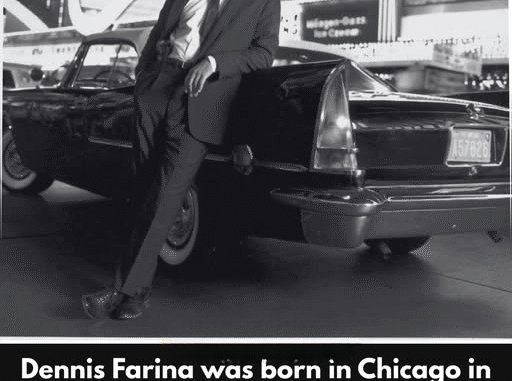
When you saw Dennis Farina on screen — cool, commanding, voice thick with Chicago grit — you believed every word he said.
Not because he was a great actor (though he was).
But because he wasn’t acting.
He had lived it.
Long before the cameras rolled, before the scripts, before the fame, Dennis Farina spent nearly two decades walking the same streets he would later portray in film and television — not as a character, but as a real Chicago police detective.
Born in 1944 on Chicago’s South Side, Farina grew up in a working-class neighborhood where life was tough and trust was earned, not given. In 1968, he joined the Chicago Police Department, rising through the ranks to become a detective in the Organized Crime Unit.
For 18 years, he worked the streets — chasing down leads, interrogating suspects, solving crimes, and facing the raw, unfiltered reality of urban crime in one of America’s most intense cities.
He wasn’t playing a role.
He was living one.
And that authenticity — that deep, unshakable sense of truth — would later become his superpower.
In the early 1980s, fate knocked in an unexpected way.
Director Michael Mann was developing a new crime series — Crime Story — and needed someone who truly understood how cops thought, moved, and spoke. He brought Farina on as a police consultant, expecting guidance.
But Mann saw something more.
During a casting session, he turned to Farina and said, “You should be on camera.”
And just like that, a detective became an actor.
Farina’s debut role? Lt. Mike Torello on Crime Story — a no-nonsense, street-smart cop leading a task force against organized crime.
The twist?
He wasn’t playing a detective.
He was one.
And audiences knew it.
There was no rehearsed tough-guy act.
No Hollywood imitation.
Just a man who carried himself like someone who’d seen too much to be fazed.
From there, Farina’s career took off — not as a flash-in-the-pan actor, but as a go-to presence in crime dramas and gritty films.
He brought that same grounded energy to Law & Order, where his role as Detective Joe Fontana felt less like casting and more like promotion.
He stole scenes in Get Shorty, playing a mob enforcer with deadpan humor.
He brought quiet strength to Saving Private Ryan.
And he appeared in everything from Snatch to CSI: Miami, always leaving a mark.
But no matter the role, the Chicago voice, the weathered face, the unhurried confidence — it all came from a real place.
Because Farina wasn’t pretending to be tough.
He was tough.
But he was also warm.
Funny.
Human.
And that’s what made him unforgettable.
For nearly three decades, Farina walked the line between two worlds:
The real one — where he’d chased criminals through back alleys.
And the fictional one — where he brought those experiences to life.
When he passed away in 2013 at the age of 69, tributes poured in — not just from fans, but from former colleagues in law enforcement and Hollywood alike.
They didn’t just remember the actor.
They remembered the man who had lived the life.
A man who didn’t need to study the role of a cop.
Because he’d been one.
Today, when we watch crime dramas, we often see actors playing at toughness.
But Dennis Farina?
He didn’t play.
He was.
And that’s why, decades later, every line he delivered still feels like truth.
He wasn’t just one of the most believable cops on screen.
He was proof that real life is the best training.